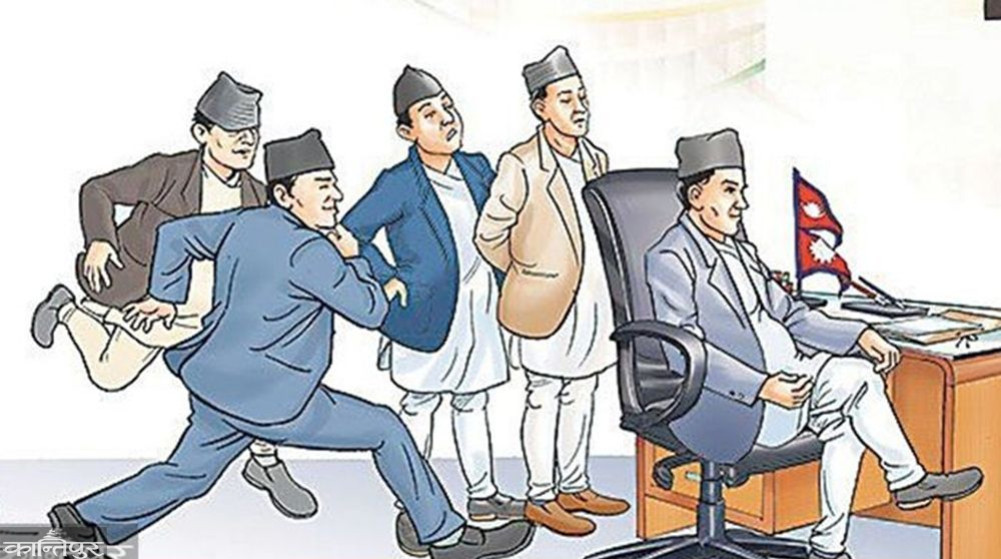A 15-year commitment to economic reform
We use Google Cloud Translation Services. Google requires we provide the following disclaimer relating to use of this service:
This service may contain translations powered by Google. Google disclaims all warranties related to the translations, expressed or implied, including any warranties of accuracy, reliability, and any implied warranties of merchantability, fitness for a particular purpose, and noninfringement.


Some time ago, an MP read out the news headlines in Parliament and strongly criticized the government's decision to cut subsidy on fertilisers. After he finished speaking, I sent a message on WhatsApp with a small photo. The issue on which he was criticizing was a decision taken when he himself was a minister and the newspaper found out about it late and printed it that day. I had mentioned the same thing in a WhatsApp message.



Such incidents are seen when the government is constantly changing. Ministers are in trouble. The current new situation is that the Prime Minister himself has started to face difficulties. If we say that the situation was good a year ago, then the government was changed because it was 'bad', if we say that it was bad, it was the government run by him! That's why we are all saying that the economy is difficult, but who is in charge of whom?
has become difficult. However, the fact cannot be broken. Economic growth, fiscal deficit, revenue mobilization situation, public debt situation have made the economy shrink. Employment as a proportion of the population is less than 35 percent. The condition of education, employment, training is not good. There is only one topic that we have to talk about a little bit - foreign exchange reserves. A lot has been discussed about this. In particular, it is a matter of being happy or not. Foreign exchange reserves have improved due to contraction in our demand and reduced imports, happy or sad about this?
Recently I was on a journey from Mechi to Mahakali. I did not find people from any sector of agriculture, services, tourism saying that the situation is good. Even if the facts and figures were negative, if the confidence had been strong, the situation would have been different. Confidence can change facts. We have some facts/facts that are correct, but if we look at the morale, the situation has worsened all over the country. Even worse, there is a mentality that the situation will worsen in the days to come, people's hope that it will improve is diminishing. Who caused the crisis of confidence so much?
After 1990, a chapter of massive structural change began in Nepal. That chapter of sweeping reform ended less than a decade later. Due to conflict in 2000, loss of trust by political parties, lack of imagination, the throat of industrialization was cut off for us. At that time we had to review the progress and weaknesses in health and education. It was time to think about how to handle the vastly expanding private sector. But instead of doing that, the state has become like a beggar and a predator in some places.
The private sector has gone from thinking about what is 'value added' to what is easily profitable. If you look at it this way, we are the political party, we are the characters, we said that we are not where there is employment abroad, where there is profit, rather than where there is real estate, what is the job of the government, rather than tying, collecting money and distributing allowances. So we are all responsible for today's economic slowdown.
Today the economy is sick, the fever has also come. But if you say that you will cure the disease without treating the fever, without giving antibiotics and directly by surgery, there will be no treatment. After lowering the fever, it is necessary to go to intensive treatment or surgery. When making monetary or financial policy, we should also think like this! Our private sector employing more than 20 people is only 18/20 percent and they too have lost confidence. There will be no improvement in other areas until their morale is improved. The private sector has not demanded everything from the government or us political parties. However, we have not spoiled everything and we cannot do everything.
The private sector wants only one thing – amendments to the law. We are in the place of making laws, there are two to three dozen such laws, which have troubled the private sector. I want to express my commitment that we will have to work on a war level to improve it. It doesn't matter whether we are in government or not because some of our commitments are already 'defined'. The first of them is that the government should work on any laws that need to be changed to improve the current market situation, we are ready to help in 'war footing'.
Secondly, the resources we have are not enough. It should not be brought from outside. The benefits of bringing in Foreign Direct Investment (FDI) need not be explained. But we should be clear about why FDI comes to us. We can look at India and China. It doesn't matter what kind of political system there is, if there is a market, foreign investment will come. Let's look at Eastern European countries, if there is infrastructure, FDI will come.
If we look at Hong Kong, Singapore or Ireland, it can be understood that if there are incentives (concessions), FDI will continue to come. The only way we can attract FDI is by giving concessions, we are very liberal on that. We said that we will give tax breaks to those working in the energy sector, they managed to bring in foreign investors, the government was under revenue pressure, the provisions of tax breaks were removed. We are not ready to bring in FDI. Non-resident Nepalis are bringing huge capital in various fields including tourism and health. We should consider this as a starting point and believe that it will attract more foreign investment.
Thirdly, no matter how much we argue, the only thing we can export is services. Information technology is becoming a big opportunity for us in the service sector. However, some of the decisions we have made in the recent past can also ruin the IT sector, I suggest that we do not make wrong decisions. It is time to have an important debate on the trade deficit as well. The agricultural sector, which accounts for more than 20 percent of our imports, must be prioritized along with resource management, however archaic it may be called. I just recently came through the postal route, with the current budget allocation it will take 40 years to complete the Sikta scheme. In the next 40 years, after the Sikta project is built, houses will grow in its command area, not rice. Let's look at the airports, auditoriums, towers we have built - we have spent our limited resources in such wrong places.
Prime Minister has announced to make agriculture decade, let's make it successful. Let's put our resources into it. Since we have little money and that money needs to be invested in infrastructure that will deliver output, let's make a list of priorities. Unfortunately, such things are not going to come in this time's budget. I can confidently say that this time's budget also repeats what was in the previous budget. We are doing the same thing over and over again.
In the next 10 years, we need a commitment between the political parties to spend the limited resources we have on infrastructure. Let us not compete to build a big temple or tower in each other's constituencies. Now our fiscal policy is either for votes or notes. Isn't it time to review our welfare programs? Contesting or reviewing our implementation of Social Security? Whether the government will reduce or increase the tax on electric vehicles in the upcoming budget, there is a situation to watch. It seems that the government hides the fact that such issues should be discussed openly and keeps it under wraps and says 'I will not tell you when I die'. That is not correct.
For economic reform, everyone should make a commitment to where we will go in 10 years or 15 years after open debate and discussion. Let's discuss some issues including remittance differently. It is true that it is not right to depend on remittances. But let's not get too emotional that this is a curse for us. Being very emotional, we are unable to give an objective interpretation to it. We say five lakh jobs are needed, but not more than 20/25 thousand will be created, at most 50 thousand. Will the remaining 4.5 million lose their jobs? Can our economy run without sending two and a half/three lakh people to work abroad for a few more years? Let's think about what to go for and what not to go for foreign employment as a whole.
If we increase the manufacturing sector in Nepal a little, employment will be created, but 90 percent of the jobs are done by non-Nepalese. Because competitive skills are not with us. What a paradoxical situation! For the jobs created in Nepal, manpower had to be brought from outside, Indian plumbers, electricians had to come and do it. As for us, we have gone abroad because there is no employment. Did we gossip about this 'mismatch'? We talk about returning people who have gone abroad. Instead, if the money coming from abroad could be invested in public infrastructure like low cost housing, how many more jobs would it have created? Are we going to argue like this? To prepare the
employment cycle, we will create 20,000 jobs in this sector this year, we will do it in this sector next year, we will send so many people abroad for that, and we will invest money from abroad here? The argument we are having about whether I will send people out or not is not taking us in the right direction. Why is this happening, we have not been able to have an open discussion on the right issues among the political parties. While competing against each other, we focused on how to make our chats more emotional.
By selling fear, creating fear, and terrorizing people, the kind of situation we are creating by saying that I am the Messiah, I will do it, my party will do it, will not bring improvement. We all have to become socialists, but for economic reform, we all need to agree that Nepal should be self-sufficient in agriculture, no matter what we wear.
- An edited part of the views expressed by Congress General Minister Thapa in the session 'Basic needs of the economy: collective commitment of political leadership' under the 'Kantipur Economic Summit-2024' organized by Kantipur Media Group in Kathmandu on Sunday.
 प्रकाशित : जेष्ठ ३, २०८१ ०८:०८
प्रकाशित : जेष्ठ ३, २०८१ ०८:०८

 २१.१२°C काठमाडौं
२१.१२°C काठमाडौं
















